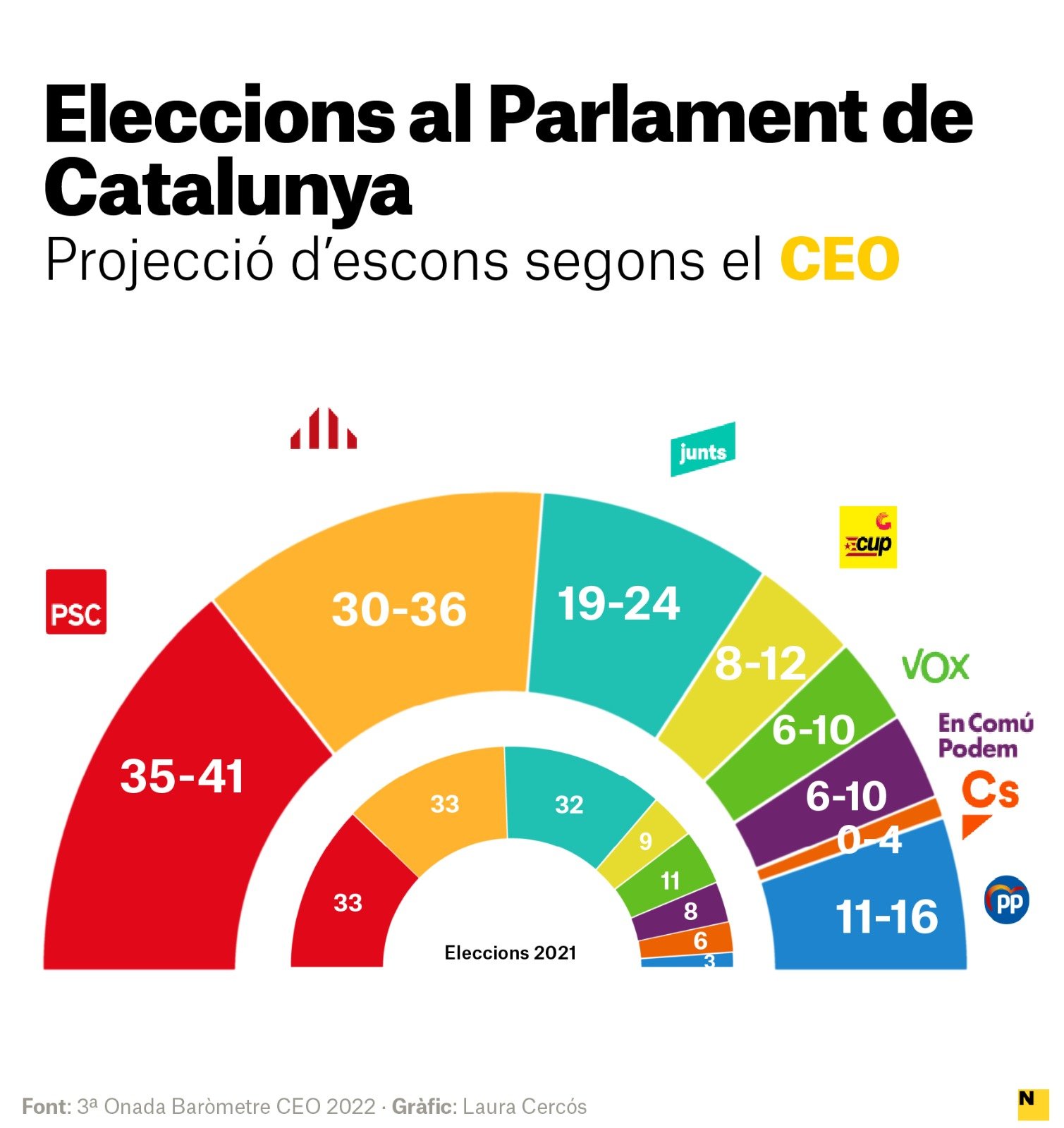The Catalan Socialist Party (PSC) of Salvador Illa would win the elections to the Parliament of Catalonia, obtaining between 35 and 41 seats, up from the 33 it has now in the Catalan chamber, according to the latest survey by Catalonia's CEO public polling agency. The Socialists maintain the lead predicted in the last poll over the Republican Left (ERC), which would be the second largest party with between 30 and 36 deputies instead of the 33 it has now. Thus, the tie in Parliament would be broken and the PSC would become the party with the most MPs. For its part, Together for Catalonia (Junts) would continue to be the third force, but with results clearly worse than the elections of 14th February, 2021 with between 19 and 24 seats, which even in the best of cases would mean losing 8 deputies from its current total of 32. In the last survey published by the CEO at the end of July 2022, the difference between the Socialists and Republicans was similar: that poll gave the PSC 36-42 deputies and ERC between 31 and 37, therefore, the expectations of both parties have fallen by one seat, on average. On the other hand, Junts was predicted to take between 22 and 27 seats in July, so has lost ground noticeably.

The PP grows at the expense of Vox and Ciudadanos
Behind the Socialists and the two major pro-independence parties is the People's Party (PP). If the 2021 elections marked a nadir for the Spanish conservative party in Catalonia, achieving one of the worst results in their history with only three seats, they are now expected to bounce back to 11-16 deputies, according to the CEO. In the previous poll, the improvement in the party's electoral results was already detected, linked to the arrival of Alberto Núñez Feijóo at the head of the party. Thus, the Catalan PP goes from being the party with the fewest representatives in Parliament to the fourth largest force in the chamber.
The good results of the PP contrast with those of Vox and Ciudadanos (Cs), their rivals on the right. In the case of Cs, the decomposition predicted across Spain in the autonomous and municipal elections approaching in May 2023 would also be experienced if elections were held in Catalonia, where, according to the CEO, they could expect a maximum of 4 deputies, while also being at risk of disappearing from the Catalan chamber altogether. In the parliamentary elections of 2021, Cs won 6 seats, already a massive drop from 2017 when they won the elections with 36 representatives. On the other hand, Vox suddenly burst into Parliament in 2021 with 11 deputies, results that they would not repeat now: the CEO expects the far-right party to win between 6 and 10 deputies.
The radical left CUP, for its part, would continue to be the fifth largest party in Parliament, with results similar to its present strength: right now it has 9 representatives in the Catalan chamber and the CEO gives it 8-12 deputies - if the upper end of this range were achieved it would be the best-ever result for the party. En Comú Podem (Comuns), the alternative left party led by Jéssica Albiach is in a similar situation to the CUP: currently holding 8 seats and expected by the CEO to achieve between 6 and 10 if a new election was held now.
And the pro-independence majority?
This legislature is usually identified as that of "the 52% pro-independence vote" - referring to the overall percentage of voters achieved by the pro-independence parties in the elections (ERC, Junts, the CUP and PDeCAT), which resulted in a majority of 74 pro-independence deputies between the three of these four parties who won seats. Now, with the new CEO survey, the best case scenario would be 72 seats in the 130-seat Parliament, that is, a majority but with fewer seats than the current total. On the other hand, many scenarios suggest that the pro-independence majority in the house is in trouble, and at worst, the total would be only 57 deputies, 17 less than now.
Add the total of all the seats of unionist and non-independence parties together and the maximums and minimums predicted are almost a mirror image of the pro-independence options: at the most 71, at the least 58 deputies. But bear in mind that this sum is based on an electorally-impossible alliance: PSC, Comuns, PP, Cs and Vox. On the other hand, since the break-up of the pro-independence coalition in the Generalitat, one of the options discussed a lot in recent weeks is the centre-left tripartite, that is, a government grouping ERC, the PSC and the Comuns. At present, the CEO survey predicts that the sum of these three parties would be 71 MPs at the bottom bend and 87 at the top end: a huge majority.
Which parties are leaking votes to which others?
One of the figures that makes the decline of Ciudadanos most evident is the fact that only 34% of those who voted for it in the 2021 elections would vote for the party again now, according to the CEO. This gives it the lowest vote retention rate in the whole Parliament, far from the second worst, which is the People's Party with only 56%. At the other end of the loyalty scale are the CUP and Comuns, with 82% and 81%, respectively. The rest of the parties move between 72 and 78% fidelity.
So, where do the majority of Cs votes end up? One of the main beneficiaries would be the PP, since although it also has a low loyalty rating, it gathers in many electoral refugees from elsewhere on the right. Almost as many 2021 Cs voters would change to the PP as would vote for Ciudadanos again, 30% and 34% respectively. The number of people leaving Cs for the PSC (9%) and Vox (7%) is also significant. And while the PSC gains small increments of voters from every party, it is most helped by those fleeing Cs. As for the pro-independence parties, it should be noted that the fall in support for Junts in Parliament - dropping from 32 deputies to a maximum of 24 - does not give significant help to ERC, which could improve its results up to 36 seats, but could also lose 3 to 30. In fact, the CUP collects the largest number of disenchanted pro-independence voters from both ERC and Junts.
Who is the most highly rated political leader?
As is often the case in polls, no political leader gets a pass mark in the latest CEO survey. The ratings are once again headed by the man who is unable to hold public office - ERC leader Oriol Junqueras, who remains banned from office as part of his sedition sentence over the 2017 independence process. but even he only reaches a 4.9 rating. Leading ERC, Comuns and CUP politicians get the highest ratings and those of the PP, Vox and Cs the worst.

